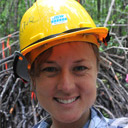
Late on an Acre afternoon we arrive at a small farmhouse along the newly-paved BR-364 Highway in the Brazilian state’s northwest.
Our planned accommodation has fallen through, so we drop by one of the families the team interviewed three years earlier to ask if we can string up our hammocks on their veranda.
The welcome is warm, generous, genuine. “Of course – with pleasure!” says Creusa Braga do Nascimento as she hustles us inside.
“It’s one of the great things about field work,” says Kaline Rossi, a young Brazilian forester who worked with Center for International Forestry Research (CIFOR) on the Global Comparative Study on REDD+ (GCS-REDD) baseline study conducted here in Acre in 2010.
“They receive you like family, and they make you feel at home. They don’t have much to eat, but what they have they share – they’re so generous,” she says.
“They have taught me a lot about life.”
Kaline, too, is from Amazonia – but she’s not a country girl. She grew up in Acre’s capital, Rio Branco, several hundred kilometres from here.
“In the city people don’t have much time to care about others, they have their activities, and they don’t really care much about connecting with others.”
“But in the field it’s so different, they really care about you.”
“They always want to talk – about the weather, about politics, about climate change – not in the scientific sense but the environmental changes they have observed – so it’s a great experience to get to know people that we wouldn’t otherwise have any contact with during day-to-day life in the city.”
In 2010, as part of GCS-REDD, Kaline spent a month visiting families and interviewing them on the progress of REDD+ initiatives in Brazil, travelling by road and river to reach the communities. She is one of 71 young, Latin American researchers who have been involved in fieldwork in Brazil and Peru through GCS-REDD.
In addition to household surveys, the scientists also held community meetings where they asked questions about livelihoods, forests, and the local economy to the whole group.
The only thing that you need is a hammock and a towel to have a wash, and that’s enough
They also held a meeting just for the women.
“Normally in the whole-community meeting, only the men talk,” she says.
“If we can get just the women together, they tend to be more sincere and clear – and more free to talk about things.
“The women’s meeting was so much fun, women talking with women, telling jokes and stories, drinking juice and eating fruit together,” she says.
“They were really friendly and we had a great relationship with them, and I think that increased the quality of the research.”
One thing that really helped to strengthen the relationship with the communities, Kaline says, is that the scientists promised to come back and share the results of the study with the communities – and they kept their promise.
“They need to have answers, they need to see what’s going on, not just feel that they give information and nothing comes of it,” she says.
“At first, people were not so enthusiastic, because they have received many people in their houses – from the government, other researchers – who never returned.
“But once they realised that we were coming back, they trusted us more, and this will be better for researchers in the future.”
Now, Kaline is back in the field again with CIFOR scientist Amy Duchelle for a preliminary visit before the team returns to do the follow up research in September.
In the last of the light, the three of us wash off the day’s dirt in Senhora Braga do Nascimento’s fish pond, trying not to think about anacondas.
Kaline says that for her, working in the field helps her to question what is really important to her.
“In the field, your tablet is not important, or your cell phone, or computer. The only thing that you need is a hammock and a towel to have a wash, and that’s enough,” she says.
“It’s a contrast to the life we live in the city, where you depend on your car, your internet, your air-conditioning, and it’s good to look at yourself sometimes when you’re in the field – to see who you really are.”
We want you to share Forests News content, which is licensed under Creative Commons Attribution-NonCommercial-ShareAlike 4.0 International (CC BY-NC-SA 4.0). This means you are free to redistribute our material for non-commercial purposes. All we ask is that you give Forests News appropriate credit and link to the original Forests News content, indicate if changes were made, and distribute your contributions under the same Creative Commons license. You must notify Forests News if you repost, reprint or reuse our materials by contacting forestsnews@cifor-icraf.org.














